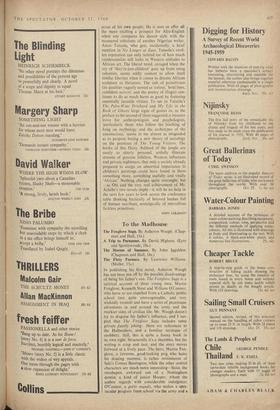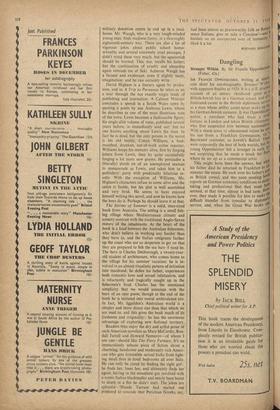To the Madhouse
The Foxglove Saga. By Auberon Waugh. (Chap- man and Hall, 15s.) .
The Storms of Summer. By John lggulden. (Chapman and Hall, 18s.) IN publishing his first novel, Auberon Waugh has not been put off by the possible disadvantage
of being his father's son. The Foxglove Saga is a satirical account of three young men, Martin Foxglove, Kenneth Stoat and William O'Connor, who leave or are expelled from a Catholic public school (not quite unrecognisable, and very wickedly treated) and have a series of picaresque adventures in and around the army and the murkier sides of civilian life. Mr. Waugh doesn't try to disguise his father's influence, and I sus- pect that The Foxglove _Saga includes some private family joking: there• are references to the Halberdiers, and a familiar mystique of snobbery. Still, this is quite a funny book in its own right. Structurally it's a shambles, but the writing is crisp and taut, and the story moves forward at a lively pace. The-hero, Martin Fox- glove, a tiresome, good-looking prig who hates his doating mamma, is rather reminiscent of Saki's Cotnus Bassington, while the other central characters are much more interesting—Stoat, the misshapen, awkward son of a Nottingham dentist, a kind of junior Hooper, whom the author regards with considerable indulgence; O'Connor, a poen, mandit, who makes a spec- tacular progress from school via, the army and a military detention centre to end up in a mad- house. Mr. Waugh, who is a very tough-minded young man, finds madness funny, in a thoroughly eighteenth-century way. There are also a lot of vigorous jokes about public school homo- sexuality and several extremely cruel passages; I didn't mind these very much, but the squeamish should be warned. This, too, recalls his father; but the combination of cruelty and absurdity again reminds me of Saki. Auberon Waugh has a fecund and exuberant, even if slightly nasty, imagination; and he can certainly write.
David Higham is a literary agent by profes- sion, and in A Trip to Parnassus he takes us on a tour through the not exactly virgin lands of publishing and journalism. A Cabinet Minister concludes a speech in a South Wales town by quoting a poem by one Ambrose Lewis. whom he describes as one of the most illustrious sons of the town. Lewis becomes a fashionable figure; his single slim volume of verse, published several years before, is immediately sold out; but no one knows anything about Lewis the man. In fact he is dead, but the only person in the secret is his old buddy, Conan. Williams, a foul- mouthed, drunken, out-of-work crime reporter. Williams keeps his memory alive, first by forging letters from Lewis, then by quite successfully forging a lot more new poems. He persuades a (literally) dumb ox of an unemployed seaman to masquerade as Lewis, and takes him to a publishers' party with predictably hilarious re- sults. With the exception of Williams, Mr. Higham's characters refuse to come alive and the satire is feeble, but his plot is well assembled and very brisk. He seems to have enjoyed himself writing this novel, and now he knows how the boys do it. Perhaps he should leave it at that.
The Storms of Summer is a solid, man-sized book from Australia. The setting is a small fish- ing village where Mediterranean climate and scenery contrast with the traditional Anglo-Saxon mceurs of the inhabitants. At the heart of the book is a feud between the Australian fishermen, who don't believe in working any harder than they have to, and the Italian emigrants farther up the coast who are so desperate to get on that they are prepared to fish the sea bare if need be. The hero is Charles Desborough, a twenty-year- old student of architecture, who comes home to the village for his summer vacation; he is in- volved in an almost ritualistic pattern of initiation into manhood; he defies his father, experiences both romantic love and sexual infatuation, and is reluctantly and tragically caught up in the fishermen's feud. Charles has the emotional simplicity that we would associate with the hero of an epic poem, though at the end of the book he is initiated into moral ambivalence too. In fact, Mr. Iggulden's Australian world is a simpler and more direct one than that which we are used to, and this gives the book much of its freshness and originality: he has the enormous advantage of exploring new fictional territory.
Readers who enjoy the dry and artful prose of such American novelists as Mary McCarthy, Ran- dall Jarrell and Howard Nemerov—of whom I am one—should like The Fiery Furnace. It's an immaculately urbane piece of fiction about a charming, handsome and moderately rich Ameri- can who gets irresistible sexual kicks from light- ing small fires in hotel bedrooms all over Italy. He can only be cured by finding the right girl: he finds her, loses her, and ultimately finds her again, having in the meantime got involved with a comic Italian blackmailer and nearly been burnt to death in a fire he didn't start. The jokes are splendid—'Maude Tarrant had started out prepared to concede that Periclean Greeks, say,
SPrCTATOR OCTOBER 21 1 9 6P sance Italians, give or take a Cimabue'—and It finishes on an unexpected note of humanilY• f had been almost as praiseworthy folk as goals;



















































 Previous page
Previous page